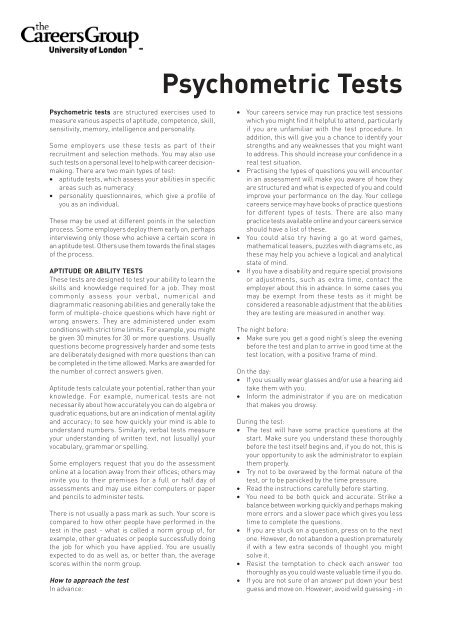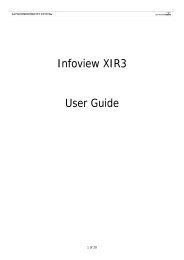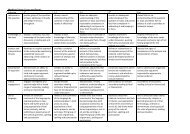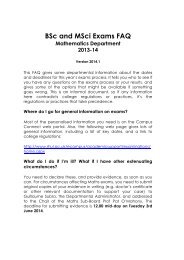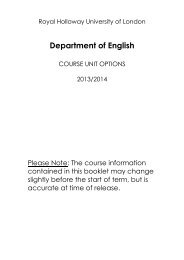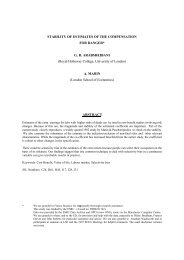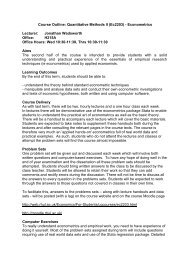Psychometric Tests
Psychometric Tests
Psychometric Tests
You also want an ePaper? Increase the reach of your titles
YUMPU automatically turns print PDFs into web optimized ePapers that Google loves.
<strong>Psychometric</strong> <strong>Tests</strong><strong>Psychometric</strong> tests are structured exercises used tomeasure various aspects of aptitude, competence, skill,sensitivity, memory, intelligence and personality.Some employers use these tests as part of theirrecruitment and selection methods. You may also usesuch tests on a personal level to help with career decisionmaking.There are two main types of test:• aptitude tests, which assess your abilities in specificareas such as numeracy• personality questionnaires, which give a profile ofyou as an individual.These may be used at different points in the selectionprocess. Some employers deploy them early on, perhapsinterviewing only those who achieve a certain score inan aptitude test. Others use them towards the final stagesof the process.APTITUDE OR ABILITY TESTSThese tests are designed to test your ability to learn theskills and knowledge required for a job. They mostcommonly assess your verbal, numerical anddiagrammatic reasoning abilities and generally take theform of multiple-choice questions which have right orwrong answers. They are administered under examconditions with strict time limits. For example, you mightbe given 30 minutes for 30 or more questions. Usuallyquestions become progressively harder and some testsare deliberately designed with more questions than canbe completed in the time allowed. Marks are awarded forthe number of correct answers given.Aptitude tests calculate your potential, rather than yourknowledge. For example, numerical tests are notnecessarily about how accurately you can do algebra orquadratic equations, but are an indication of mental agilityand accuracy; to see how quickly your mind is able tounderstand numbers. Similarly, verbal tests measureyour understanding of written text, not (usually) yourvocabulary, grammar or spelling.Some employers request that you do the assessmentonline at a location away from their offices; others mayinvite you to their premises for a full or half day ofassessments and may use either computers or paperand pencils to administer tests.There is not usually a pass mark as such. Your score iscompared to how other people have performed in thetest in the past - what is called a norm group of, forexample, other graduates or people successfully doingthe job for which you have applied. You are usuallyexpected to do as well as, or better than, the averagescores within the norm group.How to approach the testIn advance:• Your careers service may run practice test sessionswhich you might find it helpful to attend, particularlyif you are unfamiliar with the test procedure. Inaddition, this will give you a chance to identify yourstrengths and any weaknesses that you might wantto address. This should increase your confidence in areal test situation.• Practising the types of questions you will encounterin an assessment will make you aware of how theyare structured and what is expected of you and couldimprove your performance on the day. Your collegecareers service may have books of practice questionsfor different types of tests. There are also manypractice tests available online and your careers serviceshould have a list of these.• You could also try having a go at word games,mathematical teasers, puzzles with diagrams etc, asthese may help you achieve a logical and analyticalstate of mind.• If you have a disability and require special provisionsor adjustments, such as extra time, contact theemployer about this in advance. In some cases youmay be exempt from these tests as it might beconsidered a reasonable adjustment that the abilitiesthey are testing are measured in another way.The night before:• Make sure you get a good night’s sleep the eveningbefore the test and plan to arrive in good time at thetest location, with a positive frame of mind.On the day:• If you usually wear glasses and/or use a hearing aidtake them with you.• Inform the administrator if you are on medicationthat makes you drowsy.During the test:• The test will have some practice questions at thestart. Make sure you understand these thoroughlybefore the test itself begins and, if you do not, this isyour opportunity to ask the administrator to explainthem properly.• Try not to be overawed by the formal nature of thetest, or to be panicked by the time pressure.• Read the instructions carefully before starting.• You need to be both quick and accurate. Strike abalance between working quickly and perhaps makingmore errors and a slower pace which gives you lesstime to complete the questions.• If you are stuck on a question, press on to the nextone. However, do not abandon a question prematurelyif with a few extra seconds of thought you mightsolve it.• Resist the temptation to check each answer toothoroughly as you could waste valuable time if you do.• If you are not sure of an answer put down your bestguess and move on. However, avoid wild guessing - in
some tests marks are taken off for wrong answers.• Sometimes the questions get harder as you work throughthem, so do not worry if the later questions take longer toanswer.A large number of employers are now running online tests, asit is more cost-effective. You will be asked to complete andsubmit the test within a set time period. Online tests usuallyconsist of multiple choice questions to which you respond byticking the relevant box.Some tips for online tests• Make sure you understand the instructions; you will havesome practice questions to complete before you start onthe real thing.• Avoid someone interrupting you. Make sure you are in aquiet room and will not be disturbed. This might meaninforming others around you that you will be taking anonline test and you would appreciate their support.• Sit in a comfortable chair with a well-positioned table andadopt a relaxed posture.• It is also very important to make sure your computerconnection is a good one.Tips for maths testsIf you have not studied maths for some time, it is a good idea tospend some time refreshing your memory. You are often notallowed to use a calculator, so brushing up on your mentalarithmetic can save you time and give you confidence. You maywant to glance at Maths books aimed at school pupils just tocheck the basics.• Go over your times tables.• Remind yourself of some fundamental calculations suchas percentages and fractions.• Check that you can do long multiplication.• Practise estimating answers; even with a calculator thiscan help make sure you are on the right track.• Questions are often based on your ability to interpret datapresented in tables - get hold of a copy of the FinancialTimes, or a similar journal, and spend time becomingfamiliar with reading tables of information.• Do not worry about more advanced maths such as algebraor equations. These will not be tested unless the employertells you explicitly that this is the caseTips for verbal tests• These are more difficult to improve easily but you could getsome practice reading complicated texts about subjectsyou do not understand.• Try extracting the main points from passages of informationand summarising their meaning.• You could read friends’ textbooks, magazines such as TheEconomist (for non-economists!) or some unfamiliarnovelists such as James Joyce or Dickens.PERSONALITY QUESTIONNAIRESUnlike aptitude tests, there are no right or wrong answers inpersonality questionnaires. Selectors use them to identifycharacteristics that are appropriate to a specific job role, notto look for one ideal type. Personality questionnaires can explorethe way you tend to react to, or deal with, different situations.They can, therefore, help to indicate the way you might relateto other people; your work style; your ability to deal with yourown and others’ emotions; your motivations anddetermination; and your general outlook.Some tips for personality tests• Be yourself. You will not know exactly what personalqualities the selectors are seeking. Quite often they arelooking for a variety of different personalities rather thanjust one profile. In addition, the questionnaires usuallycontain checks which will highlight inconsistencies in yourapproach.• Employers will not usually give these questionnaires a lotof weight, as they are not as reliable as some other selectionmethods. However, recruiters may use your profile tostructure your interview questions. For example, if yourprofile suggests that you are not good at teamwork, theywill ask you questions about teamwork in the interview.• The questionnaires are usually untimed, but it isrecommended that you put down your first reaction to thequestions rather than spend time pondering their meaning.FURTHER INFORMATIONBooks:• How to Succeed at Interviews and Other Selection Methods,The Careers Group, 2007• How to Master <strong>Psychometric</strong> <strong>Tests</strong>, Mark Parkinson, KoganPage, 2008• How to Pass Graduate <strong>Psychometric</strong> <strong>Tests</strong>, Mike Bryon,Kogan Page, 2007• How to Pass Professional Level <strong>Psychometric</strong> <strong>Tests</strong>, SamAl-Jajjoka, Kogan Page, 2004. (Contains practice tests forthe IT, finance and recruitment sectors)• How to Master Personality Questionnaires, MarkParkinson, Kogan Page, 2000• The Times Book of IQ <strong>Tests</strong>, Philip Carter & Ken Russell,Kogan Page, 2005• How to Succeed in <strong>Psychometric</strong> <strong>Tests</strong>, David Cohen,Sheldon Press, 2007• The Ultimate <strong>Psychometric</strong> Test Book, Mike Bryon, KoganPage, 2006Useful websites:• www.shldirect.com the website of one of the UK’s largesttest providers contains verbal, numerical and diagrammaticreasoning tests - timed practice and feedback given• www.prospects.ac.uk/links/tests general information onwhat to expect, plus some typical questions, links to morepractice tests and advice on assessment centres andinterviews• www.psychometric-success.com provides the chance totry numerical, verbal, abstract, spatial and mechanical testsand looks at the rationale behind each type of testThe Careers Group is committed to providinginformation in accessible formats. An electronicversion of this document is available atwww.careers.lon.ac.uk/cep. For further formats,please contact your college careers service oremail cs@careers.lon.ac.uk.© The Careers Group, University of London 2008. Under the Creative Commons Attribution-Non-commercial-No Derivative Works 3.0License this leaflet can be copied and distributed for non-commercial purposes. Please see www.careers.lon.ac.uk/cep. Titles in thisseries: Changing or Leaving Your Course • Covering Letters • Entrepreneurship: Self-Employment, Franchising and Freelancing • GeneratingIdeas • Group Exercises • International Students: How Can the Careers Service Help You? • International Students: Work PermitsInternships, Vacation Work and Work Experience • Interviews • Job Applications • Job Hunting • Job Hunting on the Internet • MatureStudents • Medical CVs and Applications • Networking • Oral Presentations • Personal Statements • Postgraduate Study • <strong>Psychometric</strong><strong>Tests</strong> • Refocus Your Job Hunt • Speculative Letters • Students with Disabilities • Students with Dyslexia • Telephone Interviews • Working forSmall Organisations • Written and E-tray Exercises • Your CV


